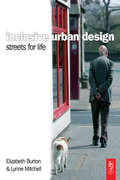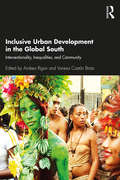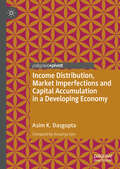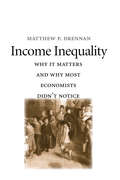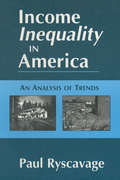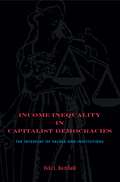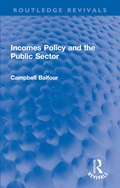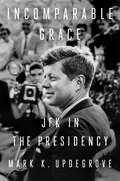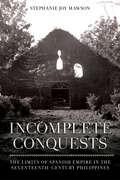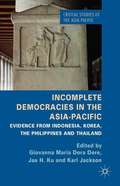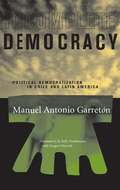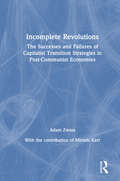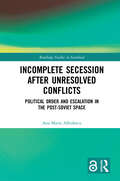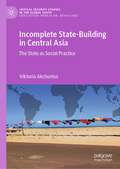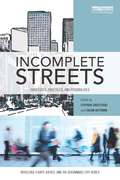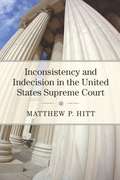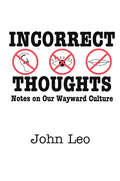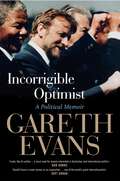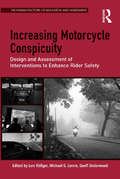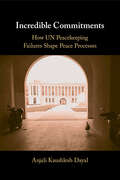- Table View
- List View
Inclusive Urban Design: Streets For Life
by Elizabeth Burton Lynne MitchellThis is the first book to address the design needs of older people in the outdoor environment. It provides information on design principles essential to built environment professionals who want to provide for all users of urban space and who wish to achieve sustainability in their designs. Part one examines the changing experiences of people in the outdoor environment as they age and discusses existing outdoor environments and the aspects and features that help or hinder older people from using and enjoying them. Part two presents the six design principles for ‘streets for life’ and their many individual components. Using photographs and line drawings, a range of design features are presented at all scales of the outdoor environment from street layouts and building form to signs and detail. Part three expands on the concept of ‘streets for life’ as the ultimate goal of inclusive urban design. These are outdoor environments that people are able to confidently understand, navigate and use, regardless of age or circumstance, and represent truly sustainable inclusive communities.
Inclusive Urban Development in the Global South: Intersectionality, Inequalities, and Community
by Andrea RigonInclusive Urban Development in the Global South emphasizes the importance of the neighbourhood in urban development planning, with case studies aimed at transforming current intervention practices towards more inclusive and just means of engagement with individuals and communities. The chapters explore how diversity of gender, class, race and ethnicity, citizenship status, age, ability, and sexuality is taken (or not taken) into account and approached in the planning and implementation of development policy and interventions in poor urban areas. The book employs a practical perspective on the deployment of theoretical critiques of intersectionality and diversity in development practice through case studies examining issues such as water and sanitation planning in Dhaka, indigenous rights to the city in Bolivia, post-colonial planning in Hong Kong, land reform in Zimbabwe, and many more. The book focuses on radical alternatives with the potential to foster urban transformations for planning and development communities working around the world.
Incognito
by Khaled TalibPope Gregoire XVII was last seen waving to the crowd at Saint Peter’s square from the famous Apostolic Palace window. Despite several layers of tight security, neither the Gendarmerie nor The Entity (the Vatican’s secret service) or the Swiss Guards claim to know anything about his sudden mysterious disappearance. As the world mourns for the pope, a frantic search begins in Italy and beyond its borders amid speculation that the Holy See may know more than they are telling. Ayden Tanner, a former British SAS commando officer — who is officially dead — is dispatched with two other crew members to find the Supreme Pontiff by The League of Invisible Knights, a covert division of Anonymous that aims to bring about the triumph of good over evil. A secret arrangement is made for Ayden to meet Rafael Rabolini, the Papacy’s press secretary, in Geneva, who might be able to tell him more. But trouble unexpectedly starts from the moment Ayden arrives in the city that winter day... The story unfolds to reveal an insidious plot by Willem Van Der Haas, a ruthless Dutch senator who has aligned himself with a world power bent on its own global ambitions. In a gasping chase that races from the snowy mountains of Switzerland to the secret passages under Saint Peter’s Basilica to the hilly terrains of Istanbul to the harsh desert air of Egypt, Ayden and his crew are forced to match wits with lethal assassins as they struggle on a desperate quest to prevent a terrifying tomorrow. A tumult of intrigue, action, suspense from the author of Smokescreen.
Income Distribution, Market Imperfections and Capital Accumulation in a Developing Economy
by Asim K. DasguptaThe book explains the problem of insufficient capital accumulation and growth in a less developed country. In conventional analyses, such explanations are often found exogenised in terms of factors such as socio-cultural attitudes towards saving and investment, irrationality of peasant behaviour, technological aspects of externalities and demographic parameters. This book provides an alternative explanation in terms of distribution of income and assets. Focusing on the agricultural sector of a developing economy, it describes how this approach can be extended to cover the industrial sector as well. Further, it develops a model that is then used to analyse the specific problem of capital accumulation in agriculture.
Income Inequality
by Matthew P. DrennanPrevailing economic theory attributes the 2008 crash and the Great Recession that followed to low interest rates, relaxed borrowing standards, and the housing price bubble. After careful analyses of statistical evidence, however, Matthew Drennan discovered that income inequality was the decisive factor behind the crisis. Pressured to keep up consumption in the face of flat or declining incomes, Americans leveraged their home equity to take on excessive debt. The collapse of the housing market left this debt unsupported, causing a domino effect throughout the economy. Drennan also found startling similarities in consumer behavior in the years leading to both the Great Depression and the Great Recession. Offering an economic explanation of a phenomenon described by prominent observers including Thomas Piketty, Jacob Hacker, Robert Kuttner, Paul Krugman, and Joseph Stiglitz, Drennan's evenhanded analysis disproves dominant theories of consumption and draws much-needed attention to the persisting problem of income inequality.
Income Inequality in America: An Analysis of Trends
by Paul RyscavageWhat is income inequality? How is it measured? Is the middle class really declining? How does it relate to poverty? How long has inequality been rising in the US? Have there been other periods in history when income differences were as large as they are today? What are the causes of growing income and wage inequality? The author addresses these and other conceptual issues in eight carefully reasoned and clearly presented chapters. Concluding with an analysis and comparison of trends in wage inequality in other developed countries, he asks the final speculative question: How much more growth in inequality can our society withstand?
Income Inequality in Capitalist Democracies: The Interplay of Values and Institutions
by Vicki L. BirchfieldThere has been much concern about rising levels of income inequality in the societies of advanced industrial democracies. Commentators have attributed this increase to the impact of globalization, the decline of the welfare state, or the erosion of the power of labor unions and their allies among left-wing political parties. But little attention has been paid to variations among these countries in the degree of inequality. This is the subject that Vicki Birchfield tackles in this ambitious book. Differences in political institutions have been seen by political scientists as one likely explanation, but Birchfield shows institutional variation to be only one part of the story. Deploying an original conceptualization of political economy as applied democratic theory, she makes the compelling case that cultural values—particularly citizens' attitudes about social justice and about the proper roles of the market and the state—need to be factored into any account that will provide an adequate explanation for the observable patterns. To support her argument, she brings to bear both multivariate statistical analyses and historical comparative case studies, making this book a model for how quantitative and qualitative research can be effectively combined to produce more complete explanations of political and socioeconomic phenomena.
Income Redistribution, Inequality and Democracy: A Political Economy Approach (Routledge Frontiers of Political Economy)
by Sung Jin Kang Hwan Joo SeoThis book examines why democracy has failed to deliver effective solutions to income inequality problems over the last four decades, and if democracy can offer solutions to various increases in inequality in the future. It also addresses what elements are necessary for democracy to serve as an effective alternative for addressing inequality issues.Historical experiences over the past 40 years, including the global financial crisis, not only underscore the need for fresh perspectives on income inequality in economics but also question the ability of democracy to continue providing alternatives for addressing the escalating forms of inequality. Seo and Kang’s response to these inquiries diverge from conventional research in several significant ways. Primarily, what sets this research apart from existing studies is its intensified focus on income inequality as a product of the complex interplay between the political and economic domains, rather than a standalone examination of income inequality in isolation. Through a political economy perspective, this book argues that income inequality and income redistribution are shaped by the institutions, policies, and laws generated by the political system, with their formation and nature being determined by the power distribution among socio-political groups.A useful resource not only to researchers who study political phenomena in the field of economics, but also to scholars who study economic phenomena in the field of politics. Furthermore, it will be particularly intriguing for policy makers concerned with issues of inequality and income redistribution.
Incomes Policy and the Public Sector (Routledge Revivals)
by Campbell BalfourOriginally published in 1972, Incomes Policy and the Public Sector is a consideration of the work conducted by The National Board for Prices and Incomes from 1965 to 1970. The Board, commonly known as the PIB, was intended to be the instrument through which an incomes policy could be shaped and guided in Britain. This book looks first at the reports that it made, and the criteria and judgements used, and then examines incomes policy by studying its impact in several areas in the public sector. Incomes Policy and the Public Sector offers a comprehensive overview of incomes policy from 1965-1970 and puts the reader in touch with ‘real economic situations’.
Incomparable Grace: JFK in the Presidency
by Mark K. UpdegroveAcclaimed author and historian Mark K. Updegrove, head of the LBJ Foundation and presidential historian for ABC News, offers an illuminating account of John F. Kennedy&’s brief but transformative tenure in the White House. &“Tremendously absorbing and inviting… An important book.&”—Doris Kearns Goodwin • &“Elegant, concise, [and] knowing.&”—Michael Beschloss • &“Rescues JFK from Camelot mythology.&”—Richard Norton Smith Nearly sixty years after his death, JFK still holds an outsize place in the American imagination. While Baby Boomers remember his dazzling presence as president, millennials more likely know him from advertisements for Omega watches or Ray Ban sunglasses. Yet his years in office were marked by more than his style and elegance. His presidency is a story of a fledgling leader forced to meet unprecedented challenges, and to rise above missteps to lead his nation into a new and hopeful era. Kennedy entered office inexperienced but alluring, his reputation more given by an enamored public than earned through achievement. In this gripping new assessment of his time in the Oval Office, Updegrove reveals how JFK&’s first months were marred by setbacks: the botched Bay of Pigs invasions, a disastrous summit with the Soviet premier, and a mismanaged approach to the Civil Rights movement. But the young president soon proved that behind the glamour was a leader of uncommon fortitude and vision. A humbled Kennedy conceded his mistakes, and, importantly for our times, drew important lessons from his failures that he used to right wrongs and move forward undaunted. Indeed, Kennedy grew as president, radiating greater possibility as he coolly faced a steady stream of crises before his tragic end. Incomparable Grace compellingly reexamines the dramatic, consequential White House years of a flawed but gifted leader too often defined by the Camelot myth that came after his untimely death.
Incomplete Conquests: The Limits of Spanish Empire in the Seventeenth-Century Philippines
by Stephanie Joy MawsonIn Incomplete Conquests, Stephanie Joy Mawson uncovers the limitations of Spanish empire in the Philippines, unearthing histories of resistance, flight, evasion, conflict, and warfare from across the breadth of the Philippine archipelago during the seventeenth century. The Spanish colonization of the Philippines that began in 1565 has long been seen as heralding a new era of globalization, drawing together a multiethnic world of merchants, soldiers, sailors, and missionaries. Colonists sent reports back to Madrid boasting of the extraordinary number of souls converted to Christianity and the number of people paying tribute to the Spanish Crown. Such claims constructed an imagined imperial sovereignty and were not accompanied by effective consolidation of colonial control in many of the regions where conversion and tribute collection were imposed. Incomplete Conquests foregrounds the experiences of indigenous, Chinese, and Moro communities and their responses to colonial agents, weaving together stories that take into account the rich cultural and environmental diversity of this island world.
Incomplete Democracies in the Asia-Pacific
by Karl D. Jackson Giovanna Maria Dora Dore Jae H. KuThis collection presents a varied picture of the state of democracy in Asia, revealing unique findings from a project entitled the 'Asia Democracy Initiative' which explored the role of ordinary people in democratization through the rise of expressive social values in Indonesia, South Korea, the Philippines and Thailand.
Incomplete Democracy
by Manuel Antonio GarretónOne of Latin America's leading sociologists, Manuel Antonio Garreton explores contemporary challenges to democratization in Latin America in this work originally published in Spanish in 1995. He pays particular attention to the example of Chile, analyzing the country's return to democracy and its hopes for continued prosperity following the 1973 coup that overthrew democratically elected president Salvador Allende. Garreton contends that the period of democratic crisis and authoritarian rule that characterized much of Latin America in the 1960s and 1970s was symptomatic of a larger breakdown in the way society and government worked. A new era emerged in Chile at the end of the twentieth century, Garreton argues--an era that partakes of the great changes afoot in the larger world. This edition updates Garreton's analysis of developments in Chile, considering the administration of current president Ricardo Lagos. The author concludes with an exploration of future prospects for democracy in Latin America.
Incomplete Revolutions: Success and Failures of Capitalist Transition Strategies in Post-communist Economies
by Adam ZwassThis volume focuses on the role of privatization strategies, contrasting the outcomes of the voucher plans with outright sale of state assets (including to foreign investors). The author considers the record of newly emerging banking and financial systems.
Incomplete Secession after Unresolved Conflicts: Political Order and Escalation in the Post-Soviet Space (Routledge Studies in Statehood)
by Ana Maria AlbulescuThis book analyses cases of incomplete secession after separatist wars and what this means for relations between central governments and de facto states. The work explores the interplay between violence and power by examining the micro-dynamics inherent in the process of escalation between separatists and central governments. These dynamics affect not only the security interactions between these entities, but also the character of political and governance relations that are built in the aftermath of secessionist war. The book provides comprehensive analyses of the evolution of post-conflict relations between the Republic of Moldova and Transnistria and between Georgia and South Ossetia and Abkhazia. Beyond these empirical and conceptual examples, the book contributes to a key debate in International Relations that addresses the relationship between democratisation, nationalism and violence, and its applicability to the study of escalation in the post-Soviet space. This book will be of much interest to students of secession, statehood, conflict studies, democratisation, post-Soviet politics and International Relations in general.
Incomplete State-Building in Central Asia: The State as Social Practice (Critical Security Studies in the Global South)
by Viktoria AkchurinaThis book is about transformation of the state and an incomplete state-building. It defies the transitology assumption of continuity, linearity and dichotomy of formal and informal in the transformation of the state. Contrary to the conventional approaches, it claims that any social order or its political scaffolding, the state, is always incomplete and we need to develop cognitive maps to better understand that incompleteness. It reflects on the social practices, processes and patterns that evolve as a non-linear result of three sets of factors: those that are historical, external, and elite-driven. Three Central Asian states - Uzbekistan, Tajikistan, and Kyrgyzstan - are examined here comparatively as case studies, as Central Asia represents an interesting terrain to challenge conventional understanding of the state. Specifically, the book captures a paradox at hand: how come three states, which made different political, economic, cultural, and social choices at the outset of their independence in the 1990s, have ended up as so-called “weak states” in the 2000s and onwards? This puzzle can be better understood through looking at the relationship among three main sets of factors that shape state-building processes, such as history, external actors, and local elites. This book applies an interdisciplinary approach, combining political anthropology, political economy, sociology, and political science. It helps conceptualize and understand social and political order beyond the “failed state” paradigm
Incomplete Streets: Processes, practices, and possibilities (Routledge Equity, Justice and the Sustainable City series)
by Julian Agyeman Stephen ZavestoskiThe ‘Complete Streets' concept and movement in urban planning and policy has been hailed by many as a revolution that aims to challenge the auto-normative paradigm by reversing the broader effects of an urban form shaped by the logic of keeping automobiles moving. By enabling safe access for all users, Complete Streets promise to make cities more walkable and livable and at the same time more sustainable. This book problematizes the Complete Streets concept by suggesting that streets should not be thought of as merely physical spaces, but as symbolic and social spaces. When important social and symbolic narratives are missing from the discourse and practice of Complete Streets, what actually results are incomplete streets. The volume questions whether the ways in which complete streets narratives, policies, plans and efforts are envisioned and implemented might be systematically reproducing many of the urban spatial and social inequalities and injustices that have characterized cities for the last century or more. From critiques of a "mobility bias" rooted in the neoliberal foundations of the Complete Streets concept, to concerns about resulting environmental gentrification, the chapters in Incomplete Streets variously call for planning processes that give voice to the historically marginalized and, more broadly, that approach streets as dynamic, fluid and public social places. This interdisciplinary book is aimed at students, researchers and professionals in the fields of urban geography, environmental studies, urban planning and policy, transportation planning, and urban sociology.
Inconsistency and Indecision in the United States Supreme Court
by Matthew P HittThe United States Supreme Court exists to resolve constitutional disputes among lower courts and the other branches of government, allowing elected officials, citizens, and businesses to act without legal uncertainty. American law and society function more effectively when the Court resolves these ambiguous questions of Constitutional law. Since lower courts must defer to its reasoning, the Court should also promulgate clear and consistent legal doctrine, giving a reason for its judgment that a majority of justices support. Yet a Court that prioritizes resolving many disputes will at times produce contradictory sets of opinions or fail to provide a rationale and legal precedent for its decision at all. In either case, it produces an unreasoned judgment. Conversely, a Court that prioritizes logically consistent doctrine will fail to resolve many underlying disputes in law and society. Inconsistency and Indecision in the United States Supreme Court demonstrates that over time, institutional changes, lobbied for by the justices, substantially reduced unreasoned judgments in the Court’s output, coinciding with a reduction in the Court’s caseload. Hence, the Supreme Court historically emphasized the first goal of dispute resolution, but evolved into a Court that prioritizes the second goal of logically consistent doctrine. As a result, the Court today fails to resolve more underlying questions in law and society in order to minimize criticism of its output from other elites. In so doing, the modern Court often fails to live up to its Constitutional obligation.
Inconspicuous Consumption: The Environmental Impact You Don't Know You Have
by Tatiana SchlossbergFrom a former New York Times science writer, this urgent call to action will empower you to stand up to climate change and environmental pollution by making simple but impactful everyday choices.With urgency and wit, Tatiana Schlossberg explains that far from being only a distant problem of the natural world created by the fossil fuel industry, climate change is all around us, all the time, lurking everywhere in our convenience-driven society, all without our realizing it. By examining the unseen and unconscious environmental impacts in four areas-the Internet and technology, food, fashion, and fuel - Schlossberg helps readers better understand why climate change is such a complicated issue, and how it connects all of us: How streaming a movie on Netflix in New York burns coal in Virginia; how eating a hamburger in California might contribute to pollution in the Gulf of Mexico; how buying an inexpensive cashmere sweater in Chicago expands the Mongolian desert; how destroying forests from North Carolina is necessary to generate electricity in England. Cataloging the complexities and frustrations of our carbon-intensive society with a dry sense of humor, Schlossberg makes the climate crisis and its solutions interesting and relevant to everyone who cares, even a little, about the planet. She empowers readers to think about their stuff and the environment in a new way, helping them make more informed choices when it comes to the future of our world. Most importantly, this is a book about the power we have as voters and consumers to make sure that the fight against climate change includes all of us and all of our stuff, not just industry groups and politicians. If we have any hope of solving the problem, we all have to do it together.
Incorporating Intersectionality In Social Work Practice, Research, Policy, And Education
by Yvette MurphyThis important book provides guidance for investigating how the social constructions of race, class, gender, age and social orientation intersect with one another, contributing to the oppression of marginalized groups in modern society. Economic and social inequities are mediated by the social locations and lived experiences of people. The intersectionality perspective is often neglected, yet it is vital for understanding social injustice and intervening on behalf of oppressed groups. In Section One, the authors propose a framework for understanding and using intersectionality to conduct research, formulate policies, develop interventions, and disseminate knowledge that improve developmental outcomes and address the economic and social disparities arising from oppression and privilege. The history of intersectionality in social work and its relevance for the professional are discussed in depth in this section. Section Two presents examples of best practices in the use of intersectionality in each of the primary domains of social work-practice, research, policy, and education and concludes with a discussion and recommendations for bringing about a fundamental change in the way social work practitioners and educators think about the profession. Intersectionality constitutes a milestone in social work literature that crystallizes the most valuable aspects of social work theory and practice-its holistic perspective, systems-based approach, and commitment to social justice-into a powerful work that is essential reading for social workers who are interested in mitigating the oppression of marginalized groups and promoting optimal development for all people.
Incorrect Thoughts: Notes on Our Wayward Culture
by John LeoA volume of political essays and social commentary, providing an alternative to the slant of much political journalism. John Leo offers his views of what is going on in law, education, advertising, television, the news media, language and various liberation movements in the USA.
Incorrigible Optimist: A Political Memoir
by Gareth EvansA colourful and central figure in Australian politics for two decades—described by Bob Hawke as having 'the most acute mind' of any of his ministers—Gareth Evans has also been applauded worldwide for his contributions, both as Foreign Minister and in later international roles, to conflict resolution, genocide prevention and curbing weapons of mass destruction.In this sometimes moving, often entertaining, and always lucid memoir Evans looks back over the highs and lows of his public life as a student activist, civil libertarian, law reformer, industry minister, international policymaker, educator and politician. He explains why it is that, despite multiple disappointments, he continues to believe that a safer, saner and more decent world is achievable, and why, for all its frustrations, politics remains an indispensable profession not only for megalomaniacs but idealists.
Increasing Aircraft Carrier Forward Presence: Changing the Length of the Maintenance Cycle
by Clifford A. Grammich John F. Schank Roland J. Yardley James G. KallimaniThe U.S. Navy's aircraft carrier fleet must meet the forward presence requirements of theater commanders. With a decreasing fleet size, planners must balance the timing of maintenance, training, and deployment with presence and surge demands. Evaluating multiple one- and two-deployment scenarios per cycle, RAND examines the feasibility of different cycle lengths, their effect on carrier forward presence, and their impact on shipyard workloads.
Increasing Motorcycle Conspicuity: Design and Assessment of Interventions to Enhance Rider Safety (Human Factors, Simulation and Performance Assessment)
by Michael G. Lenné Lars RößgerIt’s a widely recognised trend that powered-two-wheelers' (PTWs) use has been steadily increasing and is projected to increase further. While providing benefits to the community in the form of reduced traffic congestion and environmental benefits, the risks to PTW riders remain and visibility will always be a key issue. Increasing Motorcycle Conspicuity aims to illustrate how driving simulation, field studies and laboratory experiments can be used to improve rider safety through the design and evaluation of a range of safety measures. The book outlines the factors that contribute to PTW visibility and detection by car drivers, and presents case studies to illustrate how the various methods can be used to explore the contribution of these factors. The final chapter of the book highlights the utility of a simulation-based approach to improving PTW safety and discusses this method’s future applications. The case studies collected within the volume cover phases of the design of conspicuity treatments and provide a broad spectrum of empirical strategies for assessing the interventions. The book is most directly relevant to researchers and applied scientists from the fields of traffic/transportation psychology and human factors, as well as to practitioners from the traffic safety sector.
Incredible Commitments: How UN Peacekeeping Failures Shape Peace Processes
by Anjali Kaushlesh DayalWhy do warring parties turn to United Nations peacekeeping and peacemaking even when they think it will fail? Dayal asks why UN peacekeeping survived its early catastrophes in Somalia, Rwanda, and the Balkans, and how this survival should make us reconsider how peacekeeping works. She makes two key arguments: first, she argues the UN's central role in peacemaking and peacekeeping worldwide means UN interventions have structural consequences – what the UN does in one conflict can shift the strategies, outcomes, and options available to negotiating parties in other conflicts. Second, drawing on interviews, archival research, and process-traced peace negotiations in Rwanda and Guatemala, Dayal argues warring parties turn to the UN even when they have little faith in peacekeepers' ability to uphold peace agreements – and even little actual interest in peace – because its involvement in negotiation processes provides vital, unique tactical, symbolic, and post-conflict reconstruction benefits only the UN can offer.
